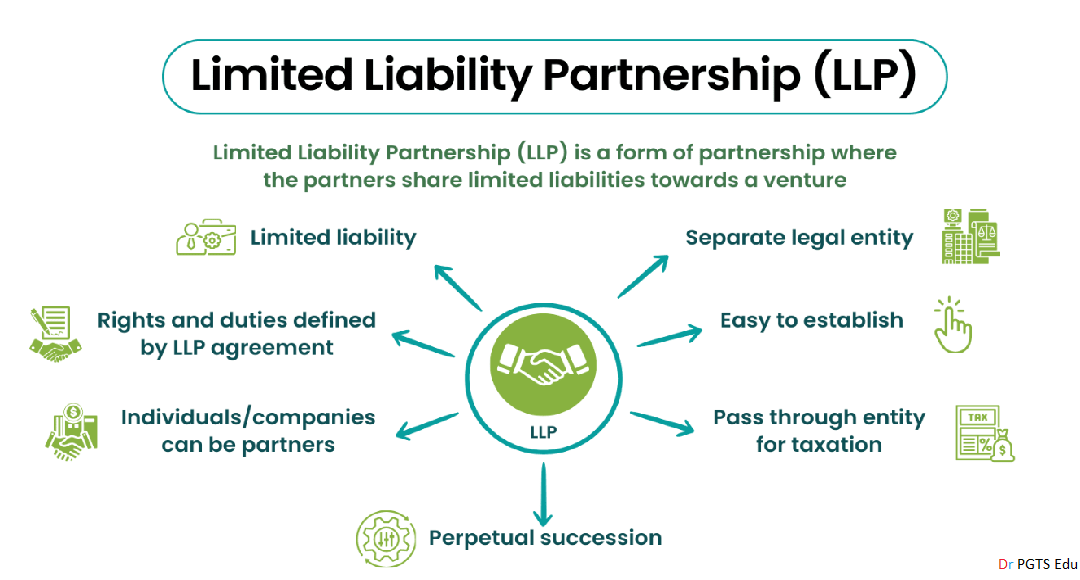Limited Liability Partnership and Joint Venture In the dynamic world of business, choosing the right structure can significantly impact long-term success. Two popular options for business collaboration are Limited Liability Partnerships (LLPs) and Joint Ventures (JVs). Each has its own advantages, disadvantages, and legal implications. This article explores these structures in detail, focusing on their characteristics, incorporation procedures, agreements, and compliance requirements in India.
Limited Liability Partnership (LLP)
Definition
A Limited Liability Partnership (LLP) is a hybrid business structure that combines features of a partnership and a corporation. It provides limited liability to its partners while maintaining the flexibility of a partnership.
Nature and Characteristics
- Separate legal entity distinct from its partners.
- Limited liability for partners, meaning their personal assets are protected.
- Minimum two partners are required, with no upper limit.
- Perpetual succession, meaning the LLP continues despite changes in partners.
- No requirement for a minimum capital contribution.
- Less stringent compliance requirements compared to corporations.
Advantages and Disadvantages

Advantages:
- Limited liability protection.
- Lower compliance burden compared to private limited companies.
- Flexible management structure.
- Tax efficiency as LLPs are not subject to dividend distribution tax.
Disadvantages:
- LLPs cannot raise capital from the public.
- Higher compliance compared to general partnerships.
- Limited recognition in some international jurisdictions.
Procedure for Incorporation
- Obtain Digital Signature Certificate (DSC) and Director Identification Number (DIN) for designated partners.
- Reserve a unique name through the Ministry of Corporate Affairs (MCA) portal.
- File incorporation documents, including Form LLP FiLLiP (Form for Incorporation of LLP).
- Draft and submit the LLP Agreement within 30 days of incorporation.
- Obtain the Certificate of Incorporation from the Registrar of Companies (ROC).
LLP Agreement
The LLP Agreement is a legal document defining the rights, duties, and obligations of partners. It typically includes details such as:
- Profit-sharing ratio
- Decision-making authority
- Capital contribution
- Dispute resolution mechanism
Annual Compliances of LLP
- Filing of Annual Return (Form 11) with ROC.
- Statement of Account & Solvency (Form 8).
- Income Tax Return (ITR-5) filing.
- GST filings, if applicable.
Business Collaboration
Definition
Business collaboration is a strategic alliance between two or more entities to achieve common goals, enhance market presence, or develop new products/services.
Types of Business Collaboration
- Joint Ventures (JVs)
- Mergers and Acquisitions (M&A)
- Strategic Alliances
- Franchising
Joint Venture (JV)
Advantages and Disadvantages
Advantages:
- Access to new markets and resources.
- Shared financial risk.
- Enhanced expertise and technical know-how.
Disadvantages:
- Potential conflicts between partners.
- Profit-sharing complexities.
- Limited control for each partner.
Types of Joint Ventures

- Equity Joint Venture – Partners contribute capital and share ownership.
- Contractual Joint Venture – No shared equity, but partners collaborate based on a contract.
- Public-Private Joint Venture – A collaboration between a government entity and a private firm.
Joint Venture Agreement
A Joint Venture Agreement outlines the structure and responsibilities of the involved entities. Key elements include:
- Investment contributions
- Profit and loss sharing
- Duration of the venture
- Exit strategy
Successful Joint Ventures in India
Several high-profile joint ventures have flourished in India, such as:
- Maruti Suzuki – Collaboration between India’s Maruti and Japan’s Suzuki.
- Hero Honda – A successful Indo-Japanese joint venture in the two-wheeler segment.
- Tata Starbucks – A partnership between Tata Global Beverages and Starbucks.
Special Purpose Vehicle (SPV)
Meaning
An SPV is a subsidiary entity created for a specific project or business purpose, ensuring risk mitigation and financial structuring.
Benefits
- Asset protection and risk isolation.
- Enhanced financing opportunities.
- Regulatory compliance benefits.
Formation of SPV
- Registering as a private or public company.
- Clearly defining objectives and operational scope.
- Maintaining separate financial accounts from the parent company.
Limited Liability Partnership and Joint Venture in India
In India, both LLPs and JVs are governed by specific regulations:
- LLPs are regulated under the Limited Liability Partnership Act, 2008.
- JVs follow agreements under the Companies Act, 2013 and FEMA (for foreign collaborations).
Choosing between an LLP and a JV depends on the business goals and risk appetite. While LLPs provide structured liability protection with flexibility, JVs offer strategic alliances with shared risks and rewards. Understanding their legal and operational aspects is crucial for long-term success.
Read also: Setting up of business entities in india

